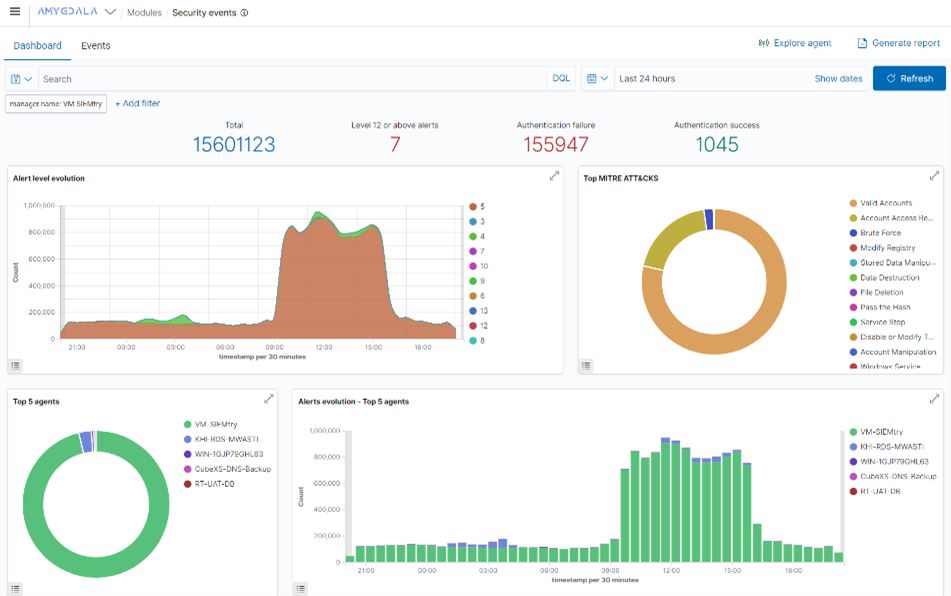System Inventory
The System Inventory module of the Amygdala XDR® provides an automated way to collect information about the hardware and software configuration of your systems being monitored by the Amygdala XDR®. This module helps organizations maintain an up-to-date inventory of all the systems in their environment.
Hardware Information
The module collects your information about the IT components of a system, such as a processor, memory, storage devices, and network interfaces.
Software Information
The module collects your information about the installed software on a system, including the os, system patches, and installed applications.
System Events
The module also collects your system events, such as logins, logouts, and system reboots. This information can be used to monitor system availability and detect security events.

Technical Description
The Amygdala XDR® System Inventory module collects information about the hardware components of a system, such as a processor, memory, storage devices, and network interfaces. This information is collected using system commands and utilities, such as “lshw”, “dmidecode”, and “ifconfig”. It collects information about the installed software on a system, including the operating system, system patches, and installed applications. This information is collected using system commands and utilities, such as “dpkg”, “rpm”, and “yum”. It also collects system events, such as logins, logouts, and system reboots. Amygdala XDR® System Inventory collects information from system log files and event log
Features
Automated Data Collection
The System Inventory module automatically collects your information about the hardware and software configuration of all the systems in the environment, eliminating the need for manual data collection.
Asset Tracking
The System Inventory module helps your organizations maintain an up-to-date inventory of all the systems in their environment, making it easier to track assets and ensure compliance with security policies.
Monitoring System Changes
The System Inventory module detects changes to the system configuration, such as the installation of new software or changes to system settings, helping to identify potential security risks.
Integration with Other Amygdala XDR® Modules
The System Inventory module integrates with other Amygdala XDR® modules, such as the Vulnerability Detection module and the Compliance module, to provide a comprehensive view of the security posture of the organization.
Technology-Supported, Protocols
The System Inventory module in Amygdala XDR®® uses Amygdala XDR agents to collect system information, which is sent to the Amygdala XDR® Manager for analysis and reporting. The agents can collect system information from a variety of technologies and protocols, including:
Operating System
The System Inventory module collects system information from various operating systems, including Linux, Windows, macOS, and FreeBSD.
System Commands and Utilities
The module uses system commands and utilities to collect system information. For example, it uses "lshw" and "dmidecode" to gather hardware information and "dpkg", "rpm", and "yum" to collect software information.
Syslog and Event Logs
The module collects system events from the syslog and event logs generated by the operating system, applications, and services running on the system.
SNMP
The module collects system information using Simple Network Management Protocol (SNMP), which is a protocol used to manage and monitor network devices.
SSH
The module collects system information using Secure Shell (SSH), which is a protocol used to establish a secure connection between two systems.
WMI
The module collects system information from Windows Management Instrumentation (WMI), which is a set of extensions to the Windows Driver Model that provides an interface to allow scripting languages to manage and monitor Windows systems.
Module Dependency
The System Inventory module in Amygdala XDR® has a few dependencies on other modules to function properly:
Agents
The System Inventory module relies on agents to collect system information from the monitored systems. Without agents, the module cannot collect data.
Amygdala XDR® Manager
The agents send the collected system information to the Amygdala XDR® Manager, where it is analyzed and reported on. Without the Amygdala XDR® Manager, the system inventory data cannot be processed or viewed.
Configuration Files
The System Inventory module uses configuration files to determine what data to collect and how to collect it. Without proper configuration files, the module may not collect the desired data or may collect too much data, leading to performance issues.
Operating System APIs and Utilities
The System Inventory module relies on various operating system APIs and utilities to collect system information, such as "lshw" and "dmidecode" on Linux or WMI on Windows. Without these APIs and utilities, the module may not be able to collect all desired information

Redefining IT Performance and Security Through Intelligent Innovation.
